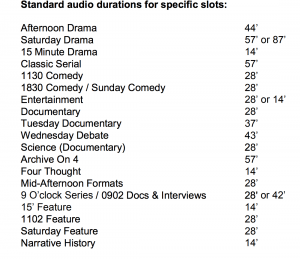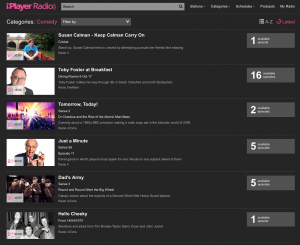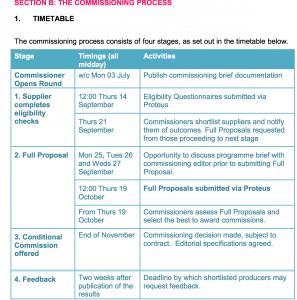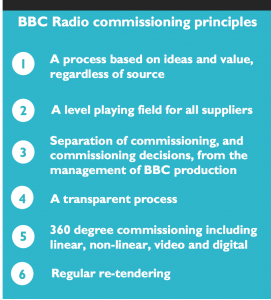This week we again met with Dylan to discuss our idea, the main conversation topic was about us attracting contributors for the project as we had only managed to get one contributor and we hadn’t seen her in a ‘comedy’ sense. This lead to the meeting mostly being about potential people we could get in contact with about the project, Dylan suggested that we contacted a lecturer and BBC journalist Matthew Gull.as he apparently has a dry sense of humour and would be willing to do this. Alongside this certain groups based in Lincoln were suggested such as the comedy society and the comedy clubs that exist in Lincoln.
Radio 4’s Audience
We intend to pitch our programme to BBC Radio 4, meaning that we need to have a deep understanding of who the Radio 4 audience and what they want from their content, this in turn means that we would be much more successful in getting our programme commisioned for BBC Radio 4.
Within Radio 4’s remit published in 2016 it does not state a clearly defined audience demographic e.g 40-50 unlike that of BBC Radio 1 with an audience of 15-29 year-olds stated within its service remit (BBC,2016), whereas Radio 4’s service remit states. ”The service should appeal to listeners seeking intelligent programmes in many genres which inform, educate and entertain. ” (BBC,2016). What this in effect means is that from the offset programmes do not have to target a specific age group, but instead they have to target a more stylised approach, with our programme being comedy this means that we would most likely be pitching the programme via the entertainment commitment of Radio 4.
In terms of radio 4’s listening figures, in the most recent RAJAR ( Radio Joint Audience Research) survery at the time of writing (June) BBC Radio 4, was stated as having a reach of 11,551,000 people with this being 21% of the population, this was combined with a strong amount of time listened per head of 11 hours (Rajar,2017). This compared to the Rajar results of May stated that it had a lower reach of 11,113,000 people, but a higher amount of listening hours per listener with 11.5 (Rajar, 2017). This means that Radio 4’s audience is growing, meaning that we would potentially have more people that listen to the programme as a whole due to this increased growth, however it is a very modest increase in growth, meaning it’s impact will be marginal.
Alongside this BBC Radio 4 has also published its own internal audience data for anyone who wishes to pitch programmes so that they can understand the station’s demographics, focusing more on the times that people listen and what people listen to. The document states that ”News attracts the largest number of listeners at 10.34m per week, while factual reaches 9.41m. Drama attracts 6.96 million average listeners a week, and comedy reaches 5.52 million.” (BBC, 2017). This in effect means that our total audience would be within those 5.52 million people rather than say the 11,551,000 due to the figures.
The internal data also states the times that listeners listen to radio 4, which shows us that the comedy programmes between 18:30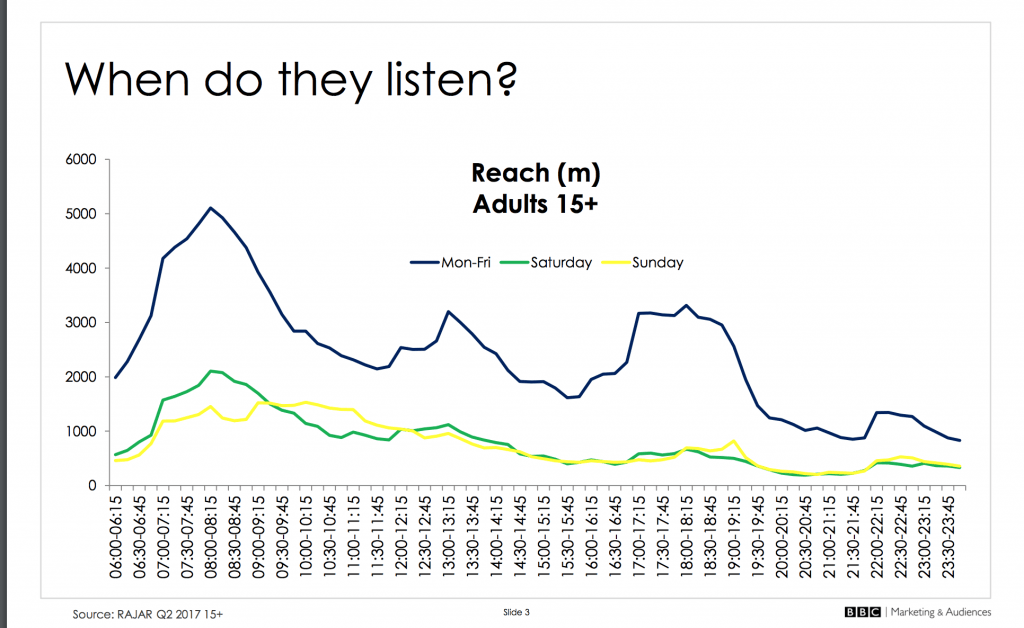 -19:00 (refer to the section on commissioning here) do well and attract the largest audience of any comedy programme through the day, meaning that we would ideally place our programme here if we were allowed. However, due to the scheduling of Radio 4 this would never happen as we would be interrupting the archers and this would never be allowed. This means it would be far more likely for us to air our programme at a weekend due to their a being a less time-constrained schedule. (BBC, 2017)
-19:00 (refer to the section on commissioning here) do well and attract the largest audience of any comedy programme through the day, meaning that we would ideally place our programme here if we were allowed. However, due to the scheduling of Radio 4 this would never happen as we would be interrupting the archers and this would never be allowed. This means it would be far more likely for us to air our programme at a weekend due to their a being a less time-constrained schedule. (BBC, 2017)
http://downloads.bbc.co.uk/bbctrust/assets/files/pdf/regulatory_framework/service_licences/radio/2016/radio1_dec16.pdf
http://downloads.bbc.co.uk/bbctrust/assets/files/pdf/regulatory_framework/service_licences/radio/2016/radio4_apr16.pdf
http://www.rajar.co.uk/listening/quarterly_listening.php
Fair dealing
Within this post, I intend to explain how we will be making use of the fair dealing clause embedded within copyright law to allow us to make use of clips that are from other sources and not owned by us. Fair dealing in our means that any published copyrighted material bar photographs are allowed to be used for the purpose of criticism, review or quotation (UK Goverment, 2017). Furthermore, we also have to give a credit to the source of the content for example with our programme this could be as simple as saying where we got the clip from, for example, LBC or BBC News etc. Another key thing is that the clip that is being used in our programme must be directly related to the programme and not have a tenuous connection to it. ( Channel 4). Finally, we must consider the length of a clip, as there is no definitive length, other than no more than needed to illustrate a point )…).With these points in mind, we will be able to use any clip that we deem relevant to the subject we’re talking about and not have to get that clip cleared by the respective organisation, meaning that the process becomes a lot easier and quicker than that of clearing content for usage. Overall this clause within copyright law makes it significantly easier for us to create our programme and without it we would struggle to do it, the one complexity we will have is where we say the acknowledgement within the piece as this mustn’t sound out of place.
Second tutorial
This week we again met with Dylan to discuss how the process had been developed, this meant explaining that we had decided how we wanted to break down the roles of research for and why we decided to do this, for example, James doing the content due to him being the one that will write the script, whereas I am acting as a producer meaning that I will be the one who will do more of the research rather than the writing. We also discussed the problems that we had encountered within the week such as who we were supposed to be aiming the programme at, this is because we had struggled with the idea of creating a programme aimed at an audience for Radio 4 and then creating this and airing it on Siren radio, so we were told to focus on putting the programme on Radio 4. The other area that was quite heavily discussed was contributors and how many people we wanted and who we wanted, it was decided that we need a panel of 5 people and within this we need at least one type of journalist, and the other 3 comedians, with James acting as a mediator/host.
This concluded our second tutorial.
Radio 4 Commissioning process
We would ideally have this programme aired on BBC Radio 4, as this is where the largest amount of commissioning for comedy is on the BBC network as, as shown in BBC 4’s style guide, and by a search on the BBC Radio Iplayer site with the search being category
https://downloads.bbc.co.uk/radio/commissioning/radio-4-style-guide.pdf https://www.bbc.co.uk/radio/categories/comedy
This clearly shows that BBC Radio 4 has numerous opportunities for comedy on its network, however, the problem that we will encounter is that there are only comedy programmes for either 28 minutes or 14 minutes, meaning that we would most likely have to pitch our idea of a comical review of the year programme as an ad-hoc commision. This is due to the fact that the programme would not fit into the commissioning opportunities that are available to us without going via this route. This means that we would have now missed the deadline to have pitched this programme for December this year as if you look at any of the radio 4 commissioning briefs it states that the pitching process alone takes over 2 months meaning that we would need to pitch our programme at a much earlier time, however it will vary via programme.
https://downloads.bbc.co.uk/radio/commissioning/R4_Book_of_the_Week_Tender_Brief_Autumn_2017.pdf
The issue that we would encounter by pitching an ad hoc radio programme is that the remit for these is incredibly difficult, the BBC site itself says that ”Please note, however, that the scope for pitching between rounds is narrow. In comedy and drama it is extremely narrow and normally related to availability of talent. This in effect means that the BBC must be fully behind our idea and believe that we would have the talent capable to pull the idea of. Due to the reasons, I have just stated above this means that we would be very unlikely to get our programme aired on BBC Radio.
Before we even got to the stage of commisioning the programme we would first need to register to be a supplier for the BBC, this means doing the following:
- We would first need to register as a corporate entity
- Have someone on the team who has experience producing network radio
- Abide by BBC data protection law/ Willing to complete it
- Comply with the BBC technical guidelines, these being:
1.Source material in a linear format and not in a compressed format
2.Smooth edits, with mixes being ridden to give a consistent listening experience
3.Peaks shouldn’t exceed -1dBFS (decibels relative to full scale
4. PPM shouldn’t exceed 6 (peaks per minute)
5. The programme should have appropriate dynamic range
6. Should be delivered as a 48k, 16 bit wav.
http://www.bbc.co.uk/programmes/articles/3RbcfDspW85d2TRG42wwhTy/technical-specification
- Comply with the BBC terms of trade (general contr
- Comply with the BBC guidelines, these being:
Bribery: complying with the Bribery Act
Children: data protection
Release policy for secondary radio and on-demand exploitation
Commercial development of digital brands
Data protection: crew
Data protection: senior
Diversity & Inclusion Commissioning Guidelines
http://www.bbc.co.uk/programmes/articles/1jgMJfv7pSW8Cl4mHgxpc5y/policies-guidelines
http://www.bbc.co.uk/programmes/articles/1L6ff727k9rVTNbLY8cBHm5/becoming-a-supplier
Once we had become a supplier we would need to submit a 250-word proposal outlining the programme and the personnel involved so in our case myself and James Paul-Hunter with an estimated price of the programme.
http://www.bbc.co.uk/programmes/articles/4fC4NcVXqkZntJv8ZHpClD8/pitching-ideas
BBC Commissioning Principles and Framework
This outlines the way in which the BBC would act when we are pitching our idea to them. The first stage is the commissioning principles which aim to make the way the BBC act with both commercial production teams (such as ourselves) or in house teams as fair as possible and make sure that everyone has an equal chance.
The other part of the principles and framework that the BBC abides by in the commissioning process is the commissioning framework which sets out the way the BBC will act with producers and make sure that they are fair and transparent. The framework consist of 13 parts:
1.Commissioning Guidelines: Outlines the objectives of the BBC within the process and how the BBC will make sure that those interested stay informed and make sure that everything is clear.
2.Editorial Control: Outlines how the BBC final editorial control and all the content that is produced is subject to their guidelines and procedures.
3.Terms of Trade : The BBC’s Objectives are to secure rights to programmes and make sure that all that do work obide by the BBC’s terms of trade.
4.Multiplatform and Audience interaction: BBC will outline when it wants multiplatform content and will consult with the relevant editor to make sure the content is suitable.
5.Proposing/Pitching ideas: States the everyone has the opportunity to pitch and that what is required within the pitch is clearly stated alongside everything being confidential.
6.Programme Pricing: Outlines how the BBC value a programme, this is based on budget, value of the programme to the schedule, third party investment, rights acquired by BBC.
7.Payment: Outlines how the BBC will pay by a method of staged payments.
8.Development: Outlines that BBC doesn’t usually fund development, however in circumstances the BBC has the option to develop programmes, decide to commission, treat development costs as included in the programme price, have costs repaid if the bbc doesn’t commission and the programme goes to a rival
9. Business Affairs: Outlines how the BBC will pay and act fairly with independents
10.Equality, diversity, inclusion and ethics: BBC will make sure that all that It works with respect their employees and abide by anti discrimination law, health and safety etc.
11. Outlines how BBC commissioners will act: They will serve the audience all over the nation and treat each company fairly and will act in a timely manner and inform producers of the process and rough timescales, they will give feedback in a timely manner if workload allows.
12; Dispute resolution: Outlines how the BBC will act in a dispute situation
13: Review: The BBC will provide an annual report stating the numbers of hours of programmes competed for and the level of competition for them.
